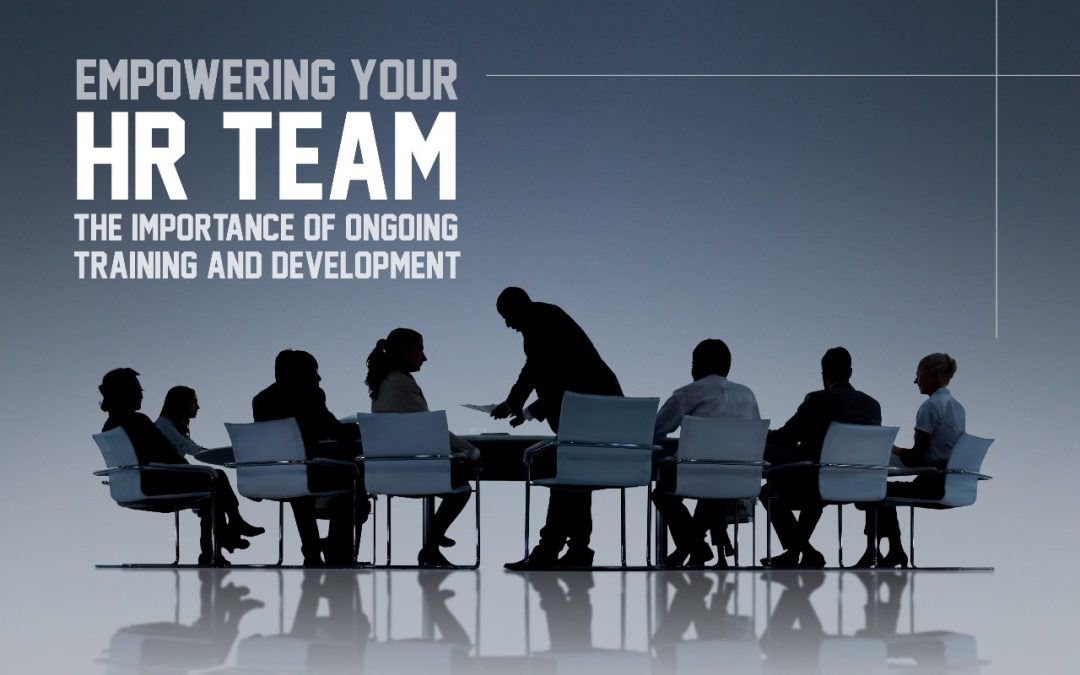In today’s dynamic business environment, keeping your HR team well-equipped isn’t just a nice-to-have; it’s essential. Ongoing training and development empower your HR team to navigate challenges and lead with confidence. This investment in your team translates to a more resilient, adaptable, and effective organization.
Imagine a workplace where your HR professionals feel continuously supported and invigorated. With regular training, they can stay ahead of industry trends, foster a positive workplace culture, and enhance employee engagement. These efforts directly reflect in your company’s growth and employee satisfaction.
Equipping your HR team with ongoing development opportunities builds a foundation of trust and growth. When your team members feel valued, they are more likely to innovate and drive success within your organization. This commitment to their growth helps establish a thriving and forward-thinking workplace.
Charting the Course for HR Enablement
Empowering your HR team requires clear training goals, leadership cultivation, and fostering continuous learning. Each of these elements builds a foundation for a dynamic and effective HR department.
Defining Clear Training Goals
Establishing clear training goals is essential for guiding your HR team. Start by assessing the current skills and identifying gaps that need filling. Create specific, measurable, achievable, relevant, and time-bound (SMART) goals to ensure the success of your training programs.
Use feedback from team members to adjust goals as needed. This approach keeps the team aligned and motivated.
Regular evaluation of these goals helps track progress and adapt to any changes in the industry. Staying responsive to these needs ensures that your HR team remains capable and well-prepared.
Cultivating Leadership Qualities
HR professionals benefit greatly from strong leadership skills. To cultivate these qualities, introduce leadership training sessions. Focus on key areas such as decision-making, conflict resolution, and emotional intelligence.
Mentorship programs are also a great way to develop leadership from within. Pairing less experienced members with seasoned professionals can foster growth and skill development.
Encourage participation in workshops and seminars. Networking with peers and learning from industry leaders provides practical insights and builds confidence. Establishing a clear path to leadership within your HR team helps retain talent and ensures continued growth.
Fostering a Culture of Continuous Learning
Creating a culture of continuous learning keeps your HR team adaptable and innovative. This involves providing access to regular training sessions, online courses, and industry events. By doing so, team members can continue to grow their skills and stay current with industry trends.
Encourage self-directed learning by offering resources like subscriptions to relevant publications or platforms for recruitment training. An awesome one to check out is SocialTalent. The recruitment training from SocialTalent is built to provide the skills and knowledge your team needs to find the right candidates.
Recognize and reward continuous learning efforts. Celebrating these achievements motivates the team to keep advancing their knowledge and skills. This not only improves individual performance but also enhances the overall capability of your HR department.
Designing an Effective Training Program
Creating a successful training program involves tailored learning approaches, modern technology, and a method to measure its success.
Customized Learning Approaches
An effective training program starts with understanding the unique needs of your team. Every organization has different goals and challenges, so a one-size-fits-all approach won’t work. Personalized training plans tailored to specific roles and career paths will increase retention and engagement.
Get feedback from your employees about their skill gaps and interests. Use surveys or focus groups to gather data. With this information, you can design a flexible curriculum that addresses these specific areas. This way, your team feels invested in their growth.
Mentorship programs and job shadowing can also offer personalized support, allowing employees to learn directly from experienced colleagues. This hands-on experience is invaluable and promotes a culture of continuous learning.
Utilizing Modern Training Technologies
Incorporating modern training technologies can make learning more accessible and engaging. Online courses, webinars, and virtual reality simulations can cater to different learning styles and schedules, offering flexibility.
E-learning platforms provide interactive content that can be accessed anytime, anywhere. This is especially useful for remote teams or employees with varied schedules. Moreover, these platforms often track progress, making it easy for you to monitor and support your team’s learning.
Additionally, gamification can make training more enjoyable. Incorporate elements like badges, leaderboards, and rewards to motivate employees. This approach transforms training into a fun, competitive activity.
Measuring Training Effectiveness
To ensure your training program is effective, you need to measure its impact. Start with clear objectives and key performance indicators (KPIs). This could include metrics like improved job performance, increased productivity, or employee satisfaction.
Pre- and post-training assessments can help gauge knowledge gains and skills improvement. Regular feedback sessions and performance reviews can reveal how the training has influenced day-to-day tasks.
Lastly, consider using analytics tools to track engagement and completion rates on e-learning platforms. This data will help you refine and enhance the training program, ensuring it continues to meet your team’s evolving needs.
Encouraging Employee Participation
Boosting employee engagement in training programs requires thoughtful approaches to make participation exciting and beneficial. From providing incentives to creating content that resonates, several strategies can foster a culture of continuous learning.
Incentivizing Professional Development
Incentives can motivate employees to take part in training programs. Consider offering rewards like certificates, bonuses, or extra vacation days for course completion. Setting up a points system for completed modules allows employees to redeem points for rewards.
Public recognition can also be powerful. Highlighting achievements in company newsletters or team meetings can drive participation. Career growth opportunities, such as internal promotions or specialized roles, serve as intrinsic motivators as well.
Creating Engaging Training Content
The quality of training content plays a crucial role. Use interactive elements like quizzes, videos, and real-life scenarios to make learning more engaging. Break information into bite-sized modules that can be completed during short work breaks.
Allowing employees to choose topics of interest can spur enthusiasm and deeper engagement. Using current, relevant examples and incorporating employees’ feedback into content updates ensures it remains practical and compelling.
Building Competency Frameworks
Developing clear competency frameworks helps employees see the pathway for progression. Outlining essential skills and knowledge for various roles guides employees on what to focus on.
Map out training programs to these competencies so that employees can follow a structured development plan. Providing personalized learning paths and regular progress check-ins can create a supportive environment that encourages ongoing participation.
Maintaining Momentum Post-Training
Keeping the momentum going after training is crucial for meaningful skill development. You need effective feedback systems, well-planned career paths, and the practical application of new skills.
Implementing a Feedback System
A robust feedback system can make all the difference. Regular, constructive feedback helps your team understand their progress and areas for improvement.
Create a schedule for feedback sessions, and encourage managers to provide positive reinforcement and constructive criticism. Use tools like 360-degree feedback and confidential surveys to gather diverse perspectives.
Encourage peer-to-peer feedback. This builds a culture of continuous improvement and accountability, leading to higher engagement and motivation.
Planning Career Development Paths
Help your team visualize their future within the organization. Create clear, achievable career development paths that align with both organizational goals and individual aspirations.
Regularly update development plans to reflect new opportunities and changing business needs. Mentorship programs can provide valuable guidance and support for your team members.
Ensure that career paths are transparent and offer a mix of short-term and long-term goals, promoting a sense of purpose and direction.
Ensuring Practical Application of Skills
The practical application of newly acquired skills ensures they stick. Encourage your team to apply new skills in their day-to-day tasks and projects.
Provide opportunities for hands-on learning through workshops, simulations, or real-world projects. Creating a supportive environment where experimentation is encouraged can lead to innovation and growth.
Regularly assess the practical use of skills and adjust training programs as needed to meet evolving business challenges.
Conclusion
Ongoing training and development for your HR team are essential for building a resilient and dynamic department capable of navigating the modern business landscape. By setting clear training goals, cultivating leadership qualities, and fostering continuous learning, you ensure your team remains engaged and skilled. Leveraging modern technologies and personalized learning approaches further enhances their capabilities.
A well-equipped HR team translates to a more adaptable, innovative organization, driving success and fostering a thriving workplace culture.












